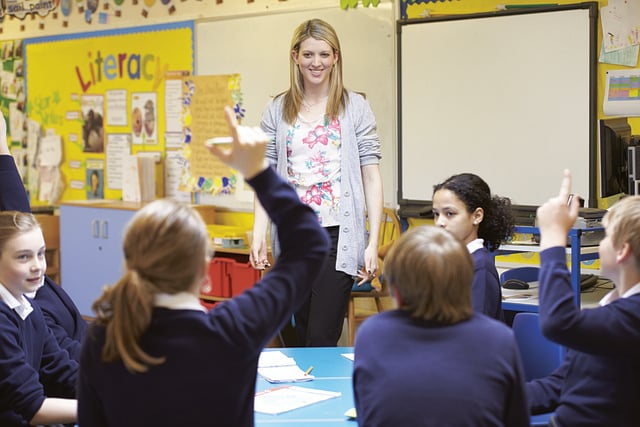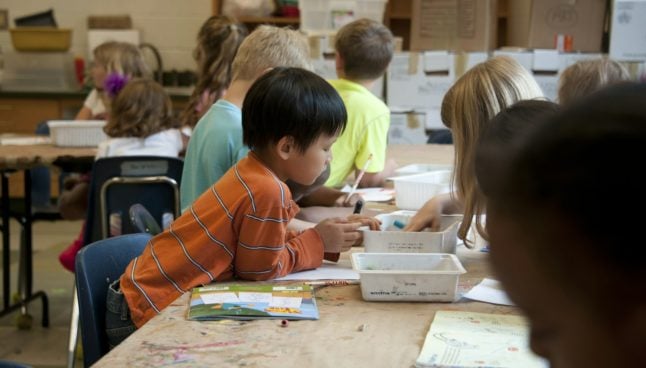Switzerland is the most expensive country in Europe for international education, a recent study carried out by International Schools Database, which compares fees and tuitions in cities across the world, revealed.
Ninety-four schools in 10 Swiss cities are geared specifically to students whose parents are foreign nationals and want their children to get an international education that is recognised abroad more widely than a solely Swiss schooling is — especially outside the EU.
Classes are typically conducted in English, though some schools have sections (or lessons) in a national language as well.
Here are five of the largest international schools in Zurich – and their cost.
Zurich International School
Arguably Zurich’s most well-known international school, Zurich International School – or ZIS – teaches some 1,200 students in American English and German on two campuses.
The school offers a so-called personal approach to education and recognises that potential may express itself in individual ways. ZIS therefore offers a range of classes and activities to best suit the students’ unique talents, skillsets, and passions.
The Zurich International School is an International Baccalaureate (IB) Organisation World School and is accredited by the New England Association of Schools and Colleges (NEASC) Commission on International Education. The school is also approved by the Department of Education of the Canton of Zurich.
Though the language of instruction is English, students who sign up to the bilingual programme as well as Kindergarten to Grade 3 (ages 3-9) are instructed in both English and German.
The school offers Advanced Placement courses (AP), the International Baccalaureate Diploma Programme (IBDP) as well as a Bilingual Pathway for students aged 3-9.
School fees
Aside for a one-off (non-refundable) 500 Swiss francs application fee, you will also need to pay a one-off infrastructure contribution fee of 5,000 Swiss francs from Kindergarten onwards.
The school’s tuition fees for 2023/24 range from 16,550 to 31,800 Swiss francs for the Lower School (ages 3-11).
For kids attending Middle School grades 6-8 (ages 11-14) the fee amounts to 35,200 Swiss francs.
Parents of Upper School kids aged 14-18 attending grades 9-12 (13) will be paying 37,900 Swiss francs.
The school also has an Individualised Learning Provision section – or ILP – which serves a small group of students who benefit from specialised teaching, a differentiated day or schedule, mainstreaming and small group scenarios.
Students in ILP pay 55,100 Swiss francs for grades 1-5 while those in grades 6-8 pay 58,500 Swiss francs.
READ MORE: How much do international schools cost in Switzerland?
Obersee Bilingual School
Based in Wollerau, the international school offers an authentic English and German education of the highest standard and vows to “prepare our students for their future, to be critical thinkers, innovators and leaders in an everchanging world.”
With 41 nationalities and 30 spoken languages represented, Obersee Bilingual School currently teaches 456 students in both English and German from baby care all the way to Upper School.
School fees
For both baby care and pre-Kindergarten a 300-Swiss franc application fee applies, while parents enrolling children into Kindergarten, Primary, Middle or Upper School will have to pay 500 Swiss francs.
Moreover, a one-off registration fee of 2,500 Swiss francs also applies at the school for new enrolments from Kindergarten onwards.
Students from grade 5 will also need to pay 950 Swiss francs for a placement test to gain entry into the OBS Middle and Upper School.
Additionally, parents will be asked to pay a deposit – ranging from 1,500 to 5,000 depending on age – which will be refunded when their child successfully leaves OBS.
The school fees for the academic year 2023/34 are as follows:
Baby care ranges from 15,820 Swiss francs for two full days to 35,795 Swiss francs for full days.
Pre-Kindergarten costs between 14,795 Swiss francs for two full days to 33,615 Swiss francs for full days.
The Kindergarten fee is 27,305 Swiss francs for 3.5 days, 28,545 Swiss francs for 4 days, or 29,795 Swiss francs for 4.5 days.
Primary School (Grade 1–4) and Middle School (Grade 5-6)
Tuition for Primary School and Middle School (Grade 5-6) is 33’500 Swiss francs for a school year with 4.5 days of instruction per week (Wednesday afternoons are free of school). The fee also covers meals and snacks.
Middle School (Grade 7-9) and Upper School (Grade 10-13)
The tuition for Middle School (Grade 7-9) and the Upper School (Grade 10-13) is 33’725 Swiss francs for one school year with 5 days of classes per week. The learning community until 5 pm as well as lunch and snacks are included. From grade 8 onwards a discount of 800 Swiss francs is granted if lunch is not taken at school over the entire school year.
Day excursions are also included in the school fee.
International School Zurich North
The International School Zurich North’s two campuses – primary and secondary – are based in two different campuses only a short 5-minute walk from each other.
The school, which is close to Wallisellen train station, relies on modern technical equipment and big, bright classrooms to provide a nurturing learning environment for its students.
With more than 30 nations represented within the school, the institution says that “a global mindset is the foundation of our identity. By teaching in English and offering EAL lessons as well as German and French, we break down language barriers and our international curriculum offers diverse opportunities to pursue worldwide destinations.”
Interested families are encouraged to book a personal tour throughout the year.
School fees
Payment of a capital fund fee is required upon registration for your first child within the school. The capital fund fee for any additional child, however, is charged at a reduced rate.
The non-refundable registration fee for your first child is 3,000 Swiss francs and 1,000 Swiss francs for any additional children that are to attend ISZN.
Payment is required half-yearly or termly in advance, the school states.
The fees are as follows:
Nursery Term Time (36 weeks): 23,410 Swiss francs (full days), 16,570 Swiss francs (half days), and 27,620 Swiss francs (enhanced days)
Pre-K Term Time (36 weeks): 28,350 Swiss francs (full days) and 32,715 Swiss francs (enhanced day)
Pre-K Year Round (50 weeks): 34,715 Swiss francs (enhanced days)
Kindergarten: 29,980 Swiss francs
Grade 1 to 5: 30,245 Swiss francs
Grade 6 to 8: 33,350 Swiss francs
Grade 9 to 12: 33,610 Swiss francs
Other fees:
- After school care is offered at short notice for a fee of CHF 30 per day.
- English as an additional language (EAL) tuition is offered at a fee of CHF 1’500 per term.
- Lunch is offered at a fee of CHF 13 per day.
- Discounts on the annual fees are offered for late enrolment or early withdrawal depending on the time of year. Please click on the button below to access our detailed financial regulations.
Tandem International Multilingual School
The institution, which has schools in Zurich, Zollikofen, and Erlenbach, currently has 197 grade 0 to 12 students at its premises in Zurich (Seefeld quarter).
Tandem International Multilingual School calls itself a dynamic day school that offers high-quality multilingual education (English, German and French) in a child-friendly environment where both local Swiss and international families are welcome.
At Tandem, classes across all grades regularly feature both English and German teachers to actively engage students in languages while its enquiry-based learning curriculum – based on the Primary Years Programme of the International Baccalaureate (IB) – ensures a stimulating, creative and thought-provoking multidimensional education.
School fees:
The fees are as follows:
Early Years (ages 0-3): 3,000 Swiss francs (5 days)
Pre-school (ages 3-4): 3,000 Swiss francs (5 days)
Kindergarten (ages 4-6): 25,560 Swiss francs (5 days)
Primary school (ages 6-12): 25,560 Swiss francs (5 days)
READ MORE: Swiss school or international school: Which is best for foreign parents?
SIS Swiss International School Zürich
As part of the wider SIS Group, SIS Swiss International School Zürich offers bilingual (British English and German), immersive education for all education levels – from kindergarten through to college.
The school – established in 2005 – teaches around 300 students from all over the world and represents more than forty nationalities.
SIS further supports families by offering useful and flexible services to try and adapt to the busy schedules of parents. This includes offers like lunch, homework supervision, (paid for) before- and after-school care, exciting activities and drop-off and pick-up lines that can be tailored to parents – even during school holidays.
At its day school, students are supervised between the hours of 7.30 am and 6 pm.
SIS Swiss International School offers the International Baccalaureate Diploma Programme (IBDP) and the bilingual Swiss Matura.
The Zurich-based school has an upcoming opening day on Friday, November 3rd, for interested parents and prospective students.
School fees
All families will have to one-time registration pay of 600 Swiss francs for the first child and 500 Swiss francs for any further child that is to attend the school.
At SIS, parents can choose between paying the whole fee at the beginning of the semester or in six-month instalments (2 percent surcharge applies).
The fees are as follows:
Kindergarten 1 and 2: 12,430 Swiss francs (2,113 Swiss francs)
Primary 1 to 6: 12,430 Swiss francs (2,113 Swiss francs)
Secondary 1 and 2: 12,710 Swiss francs (2,160 Swiss francs)
Secondary 3: 13,590 Swiss francs (2,310 Swiss francs)
Precollege 1 and 2: 12,710 Swiss francs (2,160 Swiss francs)
College 1 and 2: 13,590 Swiss francs (2,310 Swiss francs)
College 3 and 4: 14,580 Swiss francs (2,478 Swiss francs)
International Baccalaureate 1 and 2: 11,270 Swiss francs (1,915 Swiss francs)
Additionally, after-school care (optional) for all school levels costs 2,200 Swiss francs for a full week (5 days), 440 Swiss francs for one day per week, or 16 Swiss francs for a single booking per hour.
The school also grants a sibling discount of 10 percent of the school fees for the second, third, and any additional child as long as more than one child per family is enrolled. The reduction applies to the school fees of the younger child or children.



 Please whitelist us to continue reading.
Please whitelist us to continue reading.
Member comments